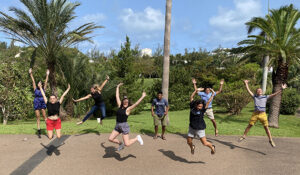BIOS Welcomes Fall Undergraduate Interns

In late August, BIOS welcomed eight students as part of the National Science Foundation (NSF) Research Experiences for Undergraduates (REU) program. For three months, these students will work alongside BIOS scientists on independent, hands-on research projects while learning a variety of related skills, such as experimental design, data analysis and statistics, scientific ethics, record keeping, scientific writing, and public speaking.
Although fall semester courses at BIOS had to be cancelled due to the COVID-19 pandemic, the Institute’s University Programs department worked diligently over the summer months to ensure the annual Research Experiences for Undergraduates (REU) program, funded by the National Science Foundation (NSF), could still take place.
“Despite the uncertainty and challenges facing us as a result of the pandemic, we were very keen to proceed with the program if at all possible,” said Andrew Peters, director of University Programs at BIOS. “We worked very closely with our colleagues at BIOS to ensure that we could host the students in a safe and responsible manner, while still providing a top rate research experience for them.”
The NSF REU program provides undergraduate students with the opportunity to participate in research-based internships, which usually run for 10 to 12 weeks at universities and research institutions. During this time, students conduct independent, hands-on research projects under the guidance of mentors, while learning a variety of related skills, such as experimental design, data analysis and statistics, scientific ethics, record keeping, scientific writing, and public speaking.
BIOS has been an REU site since 1987. For many REU interns, their experience at BIOS has led to presentations at national and international professional conferences, publications in peer-reviewed scientific journals, acceptance to graduate school, and even employment at BIOS as research technicians.
This year, BIOS welcomed eight REU students from colleges and universities from across the United States. They arrived in Bermuda in late August and began their internship experiences the first week in September after following the island’s quarantine protocols.
“Out of 30 REU sites in the NSF Oceanography program, BIOS was one of only four that was able to run in-person internships this year and it has been wonderful to be able to achieve this,” said Samantha de Putron, assistant director of University Programs. “As well as being a great hands-on research experience for the students, these internships at BIOS greatly contribute to our ongoing research programs and our REUs were warmly welcomed after many internships were cancelled in the summer.”
The following section includes a brief introduction to BIOS’s 2020 interns.
Nicole Adamson
University of California, San Diego (CA)
Major: marine biology
Mentor: Yvonne Sawall
Jacob Ancri
Rensselaer Polytechnic Institute (NY)
Major: biomedical engineering
Mentor: Andrew Peters
Jerry Goss
Olin College of Engineering (MA)
Major: electrical and computer engineering
Mentor: Leocadio Blanco-Bercial
Gaile Greene
Roger Williams University (RI)
Major: marine biology
Mentor: Amy Maas
Cali Grincavitch
Harvard College (MA)
Major: integrative biology
Mentor: Tim Noyes
Shannon Lemieux Faydo
Oregon State University (OR)
Major: fisheries and wildlife sciences
Mentor: Eric Hochberg
Natalia Padillo-Anthemides
Florida International University (FL)
Major: marine biology
Mentor: Yvonne Sawall
Adam Shaham
Georgetown University
Major: international culture and politics
Mentor: Tim Noyes
Over the coming weeks, we will be profiling each of the 2020 BIOS REU interns on our Facebook page (@biosstation) with an in-depth look at their respective research projects. We invite you to follow us on social media to learn more about the variety of research being undertaken by these students as they embark on their exciting REU internships.
